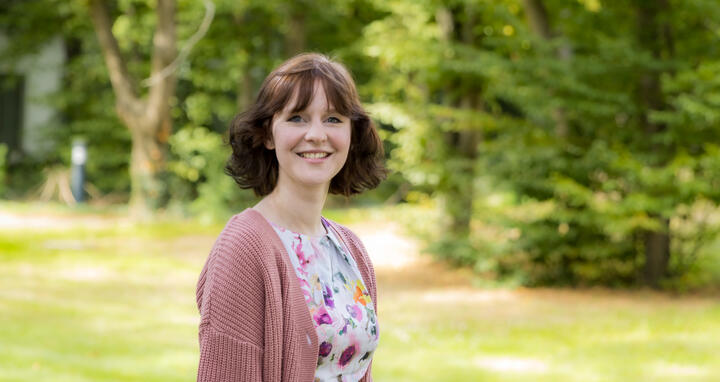Reaching out beyond the realm of science
Last year, you were working as a scientist at the German Rheumatism Research Center. Now, you are responsible for events like the Long Night of the Sciences and the Berlin Science Week at the communications department of the Max Delbrück Center, designing educational programs for teachers, and fostering enthusiasm for biomedicine among students through the "Gläsernes Labor" initiative. Do you consider yourself more of a scientist or a communicator?
At the moment, I still see myself as 75 percent scientist and 25 percent communicator. I'm striving for a 50/50 balance.
You engage closely with our researchers on a daily basis. Can you describe this collaboration?
We have a vibrant community of researchers at the Max Delbrück Center, who are active and experienced, having participated in science slams and contributed to newspapers – from doctoral candidates to postdocs and principal investigators. Many groups have been a part of events like the Long Night of the Sciences for years. They come to me with well-developed ideas. For other events, I brainstorm intriguing topics myself and then approach the groups. This was the case with the Berlin Science Week, for example.
Can you give us a glimpse of what to expect this year?
One of our upcoming events delves into the central question of the role of sex and gender in research projects and medical care. Neurological or cardiovascular diseases manifest quite differently in men and women. The question is whether we adequately consider this in research, animal models, or patient studies. While no one at the Max Delbrück Center is explicitly working on such a question, this topic holds significant importance, particularly among translational research. Additionally, we are participating in an event within the Museum of Natural History, and we have highly dedicated postdoctoral researchers who are organizing a Berlin-wide PostDoc Day.
What are your future plans?
In the long run, I believe it would make sense to include citizens, or more specifically, patient advocacy groups. I am thinking of Citizen Science projects to support participatory research. Firstly, it can be an incredibly fruitful dialogue for researchers to gain an external perspective. Secondly, such formats help to bolster societal support for research. Science communication will become more important in the future as researchers seek to secure funding through grants. That is where we can support our labs.
Is it challenging for researchers to bring their topics to the public?
I believe so. Personally, I found it quite thrilling to step out of my own bubble and engage with the public. But especially for early-career scientists, it's not always easy to confidently state, "I am an expert in this and that." As researchers, we understand the complexity of our subjects, and we aren't trained to present our topics in an easily understandable manner. How much can I simplify without distorting the facts? What is good storytelling? Bringing all these elements together was indeed challenging, and I can imagine others feel the same way.
How did you break out of your research bubble?
During my doctoral studies, I researched personalized medicine for rheumatic diseases and had close interactions with patients through support groups and speed-dating formats. The patients asked questions like, "Why did I become ill? How does my medication work? Why am I experiencing these side effects?" But there were also research-related questions, about the current state of research and hopes for cures. Assisting people in coping with their illnesses was incredibly motivating for me. I found these conversations rewarding, and I saw that they made a difference.
For me, it's a gift that my job is to tell people in my job why research is so amazing.
Is that why you chose a career in communication?
For me, it's a gift that my job is to tell people in my job why research is so amazing. Throughout the pandemic, we've witnessed the significance of scientific debates for societal support and research, as well as how political decisions are made. I want to contribute my small piece to this dialogue. I've observed how professionally developed this field is here. The wonderful thing about the Max Delbrück Center is that science communication plays an important role. For example we aim to bring our ongoing research into schools by collaborating with the "Gläsernes Labor" on its course offerings or by establishing our own program for teacher professional development.
Why is it important to not only communicate disease-related research but also topics from basic research to the public?
"Why is it interesting how this protein folds in one way or another?" I think people outside of the scientific realm often ask themselves such questions. Highlighting that through such fundamental insights, researchers can better understand health and disease is crucial. Another thing I often hear from my non-scientist acquantances is, "We now know that this protein is important in this or that neurodegenerative disease or a heart attack. So why does it still take 20 years to develop a suitable medication?" It's essential to showcase how basic research works and what the lengthy process toward testing a drug entails.
What advice do you have for researchers who want to engage with the public but are hesitant?
Come to us, and let's brainstorm together! Just give it a try! In the end, science communication isn't rocket science – and it's worth it. When my doctoral thesis wasn't progressing well, it was really motivating to hear someone say that my work was genuinely interesting and important. That was a real boost for me, and I realized, "This is why I'm doing it!"
The interview was led by Christina Anders.




